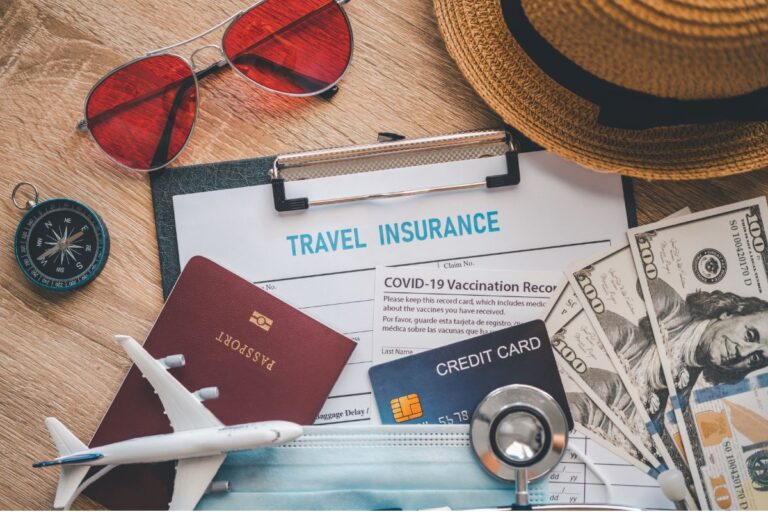
No matter how lucky you may seem or how street-smart you consider yourself to be, no one is immune to injury, theft, or any other number of nightmares that can happen during travel.
I’ve been on an international trip for about two weeks so far. Within that short span of time, I’ve already experienced an eerie number of close calls that made me very grateful I got travel insurance.
Sleep-Deprivation Fueled Absentmindedness & The Dangers of Cobblestone Streets

Just yesterday alone, I was hauling all my belongings through a very crowded area because I couldn’t wait to see this one church before dropping my luggage off at the hostel. A few minutes later, I felt like something was off. I looked down and my suitcase was gone. My heartbeat tripled in speed and I felt a pit in my stomach. I spin around frantically and retrace my steps. There’s one of two possibilities here. Either I’m really lucky, or my luggage is gone for good.
I finally arrived at the souvenir shop by the church that had stolen my attention earlier and I saw a flash of maroon in the corner near the checkout counter. There it was, my suitcase staring back at me, abandoned and distraught. The owner of the shop didn’t even notice it was there, let alone someone with ill intentions. Gratitude melted over me as I continued moseying along to my hostel.
Moments later, I awkwardly stumbled on a cobblestone and I twisted my ankle so dramatically that a few people gasped. I laughed it off as I hobbled on. Luckily, it wasn’t bad enough for me to need to see a doctor, but it easily could’ve been.
Whether human error or an unfortunate happenstance, anything can happen to anybody. No matter how long the trip is, it’s really important to take extra precautions and buy an insurance plan that will help ease your mind and bail you out of any unfortunate situation you may come across.
What is International Travel Insurance?

While it might seem like an extra expense, having travel insurance can save you from potential financial and logistical nightmares. Here are five compelling reasons why you should consider investing in international travel insurance before embarking on your next journey:
1. Medical Emergencies Know No Borders
No one plans to fall ill or get injured while traveling, but unfortunately, such situations can arise unexpectedly. Healthcare systems and costs vary widely across different countries, and medical treatment abroad can be exorbitant. International travel insurance typically covers medical expenses, including hospitalization, doctor’s fees, medication, and emergency medical evacuation if required. This coverage provides peace of mind, allowing you to focus on your recovery instead of worrying about hefty medical bills.
2. Trip Cancellations and Interruptions
Even the best-laid travel plans can be derailed by unforeseen events such as family emergencies, natural disasters, or airline strikes. These disruptions can lead to canceled flights, missed connections, or shortened trips. With travel insurance, you can recoup non-refundable expenses like flight tickets, accommodation bookings, and tour reservations. This financial safety net ensures that your hard-earned money isn’t wasted due to circumstances beyond your control.
3. Lost or Delayed Luggage
Imagine arriving at your dream destination only to find that your luggage has been lost or delayed. This can be incredibly inconvenient, leaving you without essential items or clothing. Travel insurance often covers baggage loss, theft, or damage, offering compensation to help you replace your belongings. Additionally, some policies may provide reimbursement for purchasing essential items while you wait for your luggage to be recovered.
4. Travel Assistance and Support
Navigating unfamiliar territory can be challenging, especially if you face language barriers or are unsure of local customs. Many international travel insurance policies offer 24/7 assistance services that can help you with emergency cash transfers, translation services, legal aid, and guidance in case of unforeseen situations. Having access to a reliable support network can be invaluable when you’re far from home.
5. Personal Liability Coverage
Accidents can happen, and if you’re held responsible for injuring someone or damaging property while traveling, you could face legal consequences. International travel insurance often includes personal liability coverage, protecting you from potential legal expenses and claims. This coverage ensures that you’re not left financially vulnerable due to unexpected legal liabilities.
What to Keep in Mind While Shopping for Travel Insurance
1. Read the Exclusions
Based on your personal circumstances, evaluate what you’d like prioritized in travel insurance coverage. The typical exclusions of most travel insurance policies include routine physicals, routine dental care, physical therapy, mental health care, losses due to suicide, nervous disorders, and war and riots. Each insurance plan will have different exclusions so it’s important to compare and research the best plans for you.
Here are some questions to consider as you shop for a plan:
2. Do they cover medical evacuations?

More times than not, medical evacuations (also known as repatriation) are included in comprehensive travel insurance plans. A medical evacuation often includes emergency transportation (such as ambulances) to the nearest treatment facility if the illness or injury is severe enough. This also covers the treatment and hospitalization itself.
It can also cover the cost of someone to accompany you and the repatriation of remains. Some insurance plans also offer COVID coverage. The one I purchased offers coverage for up to $50 a day for a 10-day quarantine.
3. Do they offer trip cancellation?
Most comprehensive insurance plans do offer trip cancellation reimbursement. In most instances, you’ll have to have a valid reason for cancellation which is dependent on the insurance. However, some plans offer partial reimbursement for providing no reason at all.
For plans that request reasoning, be sure to provide that within five days of the event. This could be anything from medical documents to a certificate from an employer. Read the policy to see what reasons they accept. Common reasons include the death of a family member, severe illness or injury, damage to residence, terrorist attacks, natural disasters, visa denial, loss of employment, theft of ID, transportation strikes, weather-related transportation cancellations, and more.
4. Is travel insurance offered by your credit card company?

Sometimes, trip insurance is offered by your credit card company. This mostly applies to credit cards designed for travel. See a full list of credit cards with these benefits here.
Oftentimes, credit card travel insurance includes car rental insurance, baggage insurance, trip delay insurance, trip cancellation or trip interruption, travel accident insurance, and emergency evacuation insurance. As always, read the fine print, as all credit card companies offer something different.
5. What kind of assistance services do they offer?
If you need extra assistance services, this is often something that is either already incorporated or can be an add-on to your plan. My travel insurance plan offers a way to easily communicate with representatives to book a doctor’s appointment, inquire about coverage, relay messages to family members, rebook tickets, and more. It is a way to feel less alone in the daunting world of travel insurance and have the ability to make sure everything is smooth sailing. I always look for a company with a good reputation for communication so that I’m not scrambling and left in the dark, especially during an emergency.
6. Do they cover your rental car?

As mentioned before, credit cards typically cover rental car insurance. There may be a few travel insurance plans that include rental car coverage but most often, this would be an add-on rather than something included in the base package. If you’re looking for more nuanced and customizable insurance, I recommend checking out Squaremouth, a network that represents 30 different insurance companies and 90 different plans.
7. Do they offer coverage for baggage delay insurance?

Most comprehensive plans offer baggage delay insurance, which covers baggage loss, delays, or damage. Some have a per day reimbursement of a certain amount for the number of days your bags are lost. Check the fine print, because certain items may not be covered, such as electronics, precious metals, cameras, etc. Also, this is customizable as well, depending on the value of everything you’re bringing.
8. Does Travel Insurance Typically Have a Deductible?
Some travel insurance plans have a deductible, while others do not. Those with lower monthly premiums do typically have a deductible,e while those with higher monthly premiums do not. Compare insurance companies and do the math to see what’s best. For my insurance plan, I have a deductible of $250 but a lower monthly premium of $45.08. Some of the plans featured on Squaremouth have deductibles ranging in amounts, with some having no deductible at all. Those with no deductible typically have a higher monthly premium.
Tips on Buying Travel Insurance:
- Get a quote from several different companies
- Read reviews of each travel insurance company
- Most travel insurance companies don’t cover pre-existing conditions so come up with a plan with your current insurance provider and doctor before your trip
- Read the policy completely before purchasing. Be aware of what is covered and what is not. Check the fine print.
- Start as soon as you know you’re going on a trip. That way you could take advantage of any cancellation coverage.
Travel Insurance Companies to Consider
SafetyWing
Pros:
- Great Travel Assistance: They have a chat box on their website that makes them easy to contact. You could ask about coverage, get directed to a portal that will help you book appointments, and make general inquiries.
- Straightforward Claim Process: On your Safetywing portal, filing a claim is the first call to action button which makes it easy and convenient. Claims often take 30-45 business days to process
- Digital Nomad Specific Plan: Safetywing offers two main plans, a month-by-month plan for temporary travelers and a yearly plan for digital nomads.
- Home Country Visits: Brief visits back to your home country are covered.
- Mid-Trip Policy Purchase: They allow you to start a policy while you’re already abroad
- Affordability: starts off at $45.08 for 10-39-year-olds and increases per decade if you’re older. If you want to include coverage in the US, it is about twice as much.
Cons:
- Safetywing does not cover pre-existing conditions, routine check-ups, cancer treatments, injuries for certain adventure sports, travel to Iran, Cuba, and North Korea, and stolen or lost personal items.
- Safetywing does not provide coverage for traveling within your home country
- If you are planning to travel to the United States, it’s essential to include the US as an add-on, as it falls outside the coverage of the basic package. Including the US does increase the price significantly.
- Safetywing has a deductible of $250, which some travel insurance companies do not have
Squaremouth
Pros:
- Diverse Options: Squaremouth hosts a database of insurance plans rather than being its own. Therefore, there is a wide range of insurance policies to choose from, which allows for great customizability.
- Zero-Complaint Guarantee: Squaremouth only works with goo,d reputable providers. However, if you do run into issues, they will be there to advocate for you. You have to process all claims through the individual company, but you could complain to Squaremouth and they would go to the provider on your behalf.
- No Deductible: Some plans have no deductible, which can be very appealing
Cons:
- They don’t operate any of the plans, so they don’t have a lot of control. They can only do so much advocating and don’t have the final say in the claim decision.
- The number of options can be very overwhelming. There are 30 different insurance providers with over 90 different plans to choose from. It’s best to know what you want out of an insurance plan so you don’t endlessly scroll. This can be both a pro and a con.
- With so many different insurance plans come many mixed reviews. Especially when Squaremouth doesn’t have the ultimate control, it makes sense why the reviews can be all over the place.
World Nomads
Pros:
- Extreme Sports Coverage: World Nomads is great for thrill-seeking travelers and offers coverage for more than 200 kinds of sports. There are several packages to choose from based on what kind of adventures you want to have. The standard package includes horseback riding, ziplining, and river tubing. If you want something even more thrilling, the explorer’s package offers coverage for activities like skydiving, ice climbing, and shark cage diving. Check the restrictions per activity because there are some limits to what they’ll cover.
- Emergency Assistance: They offer 24/7 emergency assistance no matter which plan you choose. They can help with anything from getting a prescription internationally to finding emergency care specific to your needs. Beyond medical insurance, they’re also there to help with lost or stolen items or any other logistical dilemma.
- Coverage Extension Available: If you need to extend your coverage, it is possible to do so mid-trip. A typical policy lasts for 180 days.
Cons:
- Like many other travel insurance plans, there is no coverage for pre-existing medical conditions. A pre-existing condition is defined as anything you’ve shown symptoms for, been tested or treated for, been recommended to get a test for, or received a prescription for.
- Travelers over 70 (in the USA) are disqualified from purchasing insurance through World Nomads. Restrictions vary based on the country you’re from.
- There is no “Cancel for Any Reason” upgrade available. Some travel insurers offer a way for customers to cancel their trip and receive a partial refund on non-refundable purchases.
Conclusion
While it’s tempting to focus solely on the excitement of exploring new destinations, responsible travelers recognize the significance of international travel insurance. It’s a safeguard against the uncertainties that can arise during your journey, offering financial protection and peace of mind.
Whether you’re embarking on a leisurely vacation or a business trip, having the right insurance coverage can make all the difference in turning a potential disaster into a manageable inconvenience.
Remember, it’s not just an extra expense; it’s an investment in your safety and well-being while you explore the wonders of the world.
Author Bio: Isabella Miller is a travel journalist and editor at Go World Travel Magazine. She is a passionate world explorer with an appreciation for the vast range of the human experience. She wants to live it all, from backcountry camping in the Great Sand Dunes to marinating in a saltwater geothermal pool in the Italian Alps. She loves the yin and yang of cities and nature, celebrations and peace, adventure and relaxation. The best kind of trip is when all of the above coexist. This world is nuanced and delicate, filled with infinite stories to tell. She takes great pride and joy in sharing her discoveries with the world.
Read More:
Want to discover more hidden gems and helpful travel tips? Join our free newsletter for the latest travel secrets and travel articles.
We are reader-supported and may earn a commission on purchases made through links in this article.

